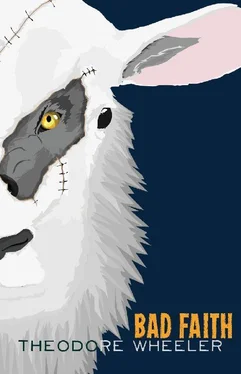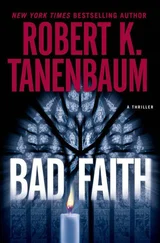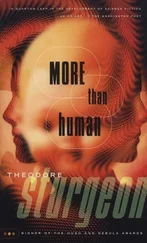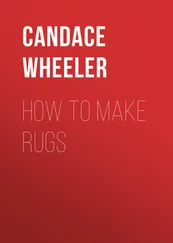Maybe that’s why I couldn’t stand being around people who adored Jacq’s work. I didn’t exist to her admirers. Actually, it was worse than that. They saw me, they knew I was Jacq’s husband, and just wished I wasn’t there. At galleries, museums, private showings, art schools, universities — it was all the same. Whether they were trendy or rustic, retro or futuristic, queer or confused, they all made vile faces at me, using the tannins of a bitter wine to twist their mouths. They’re sinister people.
I assumed Jacq messed around. She’s an artist, after all, and it was easy to believe in the trappings of that identity. Beautiful, stylish people could be persuasive, young men whose pants bulged, experienced women who did interesting things with their smiles and stroked Jacq’s jaw with their long fingers. She might have had flings, spontaneous encounters, maybe in a gallery restroom while I was occupied at a crowded opening night soirée. It was possible such things happened. Most people would understand how that worked. Jacq had a history, a notorious past her friends liked to reminisce about, a young woman in the city. You can do the math.
When we met, Jacq said she liked me because I was stable. “A nice, trustworthy man,” she called me. It sounded like an insult coming from her.
Sitting out on the hotel terrace in Atlanta that first night, ruminating over a neat bourbon, I thought that an affair of my own was a distinct possibility. If Jacq had done it, so could I. I watched the girl with the toy radio stare off into the distance, listening to talk; I worried about what Jacq might do with the assistant dean, or a visiting professor from Lyons, if there was one. There’s something noble, isn’t there, about being the second one in a marriage to stray. If you are the aggrieved and you stand up for yourself, people should applaud.
Jacq went to Savannah the next day in a hired car. Riding in cars she managed fine without me. She liked talking to the driver, finding out about his family and where he came from. It’s different with pilots, who you’re not allowed to see work. With a driver, you know if they’re paying attention, or if they’ve had a few drinks, or if they’re sleepy. If they’re sleepy, you can chat to keep them awake. Drivers like to chat. They never seem to be from the place where they are, so you can ask how they ended up in Georgia, driving Lincoln Town Cars. That’s what Jacq would do. She grew up in Ohio, the third daughter of auto workers, and ended up spending most of her life in New York City, painting with her menstruations. She understood better than most how funny life could be.
I saw the girl on the hotel terrace again that evening. She was at the same table as before. When I asked about her, the waiter told me she’d been there all day. “All week, sir, to be exact. Hasn’t moved as far as I seen. She just sit with that radio.”
She was pale, which was odd for a young woman in that climate. She sat near the rail, dabbling at ranch dressing with raw vegetables, drinking some sour cocktail through a straw. A wispy linen dress hung from her shoulders. She held the toy radio, the drawstring loose around her wrist. I asked if there was any way I could help.
“I’m sorry,” she said. “With what?”
“You seem stifled. Are you all right?”
“Me?”
“That radio, for example. It’s such a strange thing. Something a kid would carry.”
“This? It’s nothing,” she said. “Just the news. I like to hear the weather. Though they’re arguing over the school board now.”
“Do you mind?” I asked, scraping over a cast-iron chair to join her.
She extended her hand. “I’m Anna,” she said. She turned off the radio and dropped it into her purse.
Anna told me she was visiting from St. Louis while her house was under reconstruction. Her husband suggested, and she consented, that it would be more enjoyable for her to take a vacation than wait until the house was no longer a disaster area. He would summon her when the work was done.
She asked if I was married and I didn’t lie — I was an apparent tourist, middle-aged, in khaki shorts, wearing my wedding band. I had a walker’s physique: fit in some places, not so much in others. I told Anna that my wife was an artist. Anna’s husband worked in government, she said. He wanted to be elected to high office some day. He worked campaigns for principals in the local party now, as many as he could get in on. In fact, that’s how she met him. She’d been an intern for Kit Bond while an undergrad at SLU.
“Wish I could do more for him,” she said, “career-wise. Besides making a family, I mean. We don’t have babies,” she added, quietly.
When Anna talked about how practically everyone who mattered in St. Louis knew who her husband was and what he wanted, it sounded like she despised him for his ambition. She had a habit of glaring at her hands when she spoke. She confessed that she had no idea what she was doing in Atlanta.
“My neighbor set up the trip, honestly. Rita came over and used our computer to do it. What did she call this place? Hotlanta ?” Anna grinned as she said this, hand over her mouth. “She said something about the heat and how it made folks hunger. My neighbor is a lonely woman, I think. I don’t know why I trust her.”
Anna picked at celery stalks as she talked. She somehow managed to not take bites when she put food to her mouth — she bit without biting through — there were teeth marks in the carrots on her plate. She’d only ordered because the waiter kept asking if she wanted something.
We talked about marriage a long time. The good stuff, then the bad, then the qualifications and excuses. Our conversation followed a plot arc. Something happened to Anna, she was emotional, she calmed down, something else happened a few weeks after that, and it wasn’t until later that she remembered the first thing, the original outrage, and by then it was too late for her to do something about it. Her resentment piled up. My stories were the same, structurally. We turned listless and bleak, hearing about each other’s marriage wounds. They lacked finality. We wanted firm endings and closure.
Neither of us had been to Atlanta before. We talked about being there. It was something different to talk about, something universal to our kind, being on vacation.
“I haven’t even left the hotel yet,” Anna confessed. “I took a taxi cab from the airport. I’ve been here ever since.”
I convinced her that we should see some sights together. Jacq would be in Savannah all the next day too.
“We should go to the MLK stuff, at least. I need someone to see it with. You can’t go to things like that alone. People will think you’re up to something.”
Jacq almost married Ampiere, years ago, a few months before she met me. He backed out before they had anything legalized. They’d been together for years, off and on. Jacq adored him. She followed him around and let him introduce her to people. There were blurbs about them in the Village Voice , the Post , elsewhere. Ampiere was prone to grand, meaningless gestures, the kind of sadism women found charming. Jacq let Ampiere have his way with her. He didn’t want to marry her, however. He made this clear, in a hotel room with a half-dozen aspiring male models, then fled to Europe after 9/11 because he was too anxious to stay. To her credit, Jacq didn’t chase him there. She couldn’t hold it against him, I don’t think, his betrayal. She didn’t have it in her to hate Ampiere. If he wanted to fly off to Italy to explore bodies she would let him. Jacq was fine with staying in New York. She had her own occupation, after all.
Even if she let Ampiere go, I don’t think she ever really got over him. That’s why the magazine bugged me so much on the way to Atlanta. There he was, in swimming briefs and black sunglasses, with a woman who was too beautiful for him.
Читать дальше












